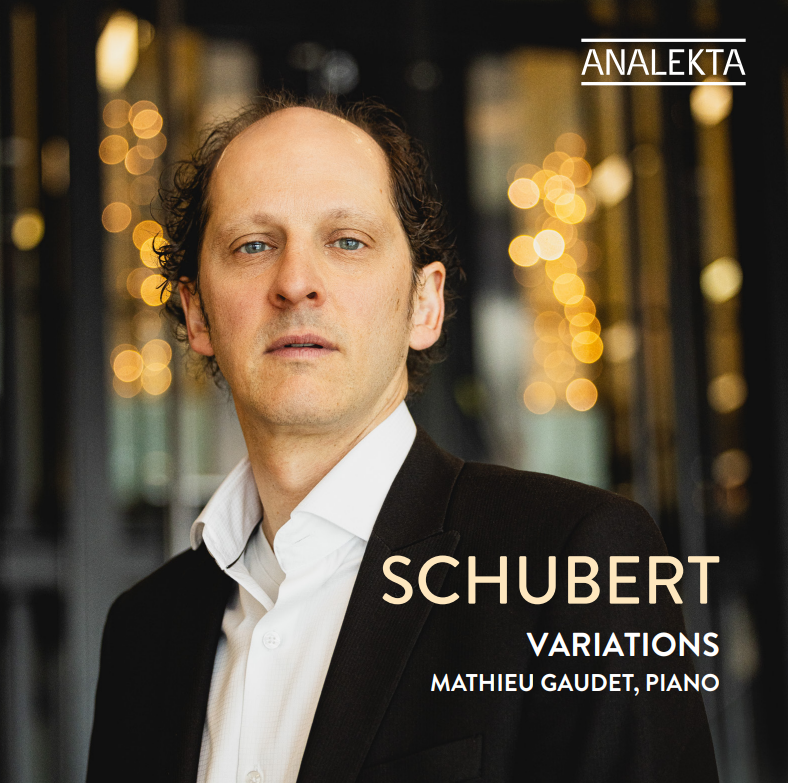
Mathieu Gaudet’s Variations: Inside an Epic Schubert Recording Project
On July 11, Analekta Records released the 11th CD in its monumental project to record the complete solo piano works of Franz Schubert — a journey that has become both a musical and personal odyssey for Canadian pianist Mathieu Gaudet.
The newest release, Variations, features Schubert's Second Piano Sonata D.279, the 12 Valses Nobles D.969, and the D935 Impromptus.
Since 2019, Gaudet has been steadily working through Schubert’s tuneful, expressively rich, and deeply human sound world, releasing two albums per year. Now past the halfway mark, his interpretations have been praised internationally, positioning him among today’s foremost Schubert interpreters.
From Concert Hall to Recording Studio
The seeds for the recording project were planted during a multi-year concert series in Montreal. “I had been playing all of them in concert, actually, in a Montreal… there was 3 concerts every year, and I was going through all 20 piano sonatas and all the major piano works,” Gaudet recalled. “As I was going through the project, I realized that I cared very much for this music… and it would make such a good recording project.”
Inspiration came from one of his mentors, Canadian pianist Anton Kuerti. “He recorded a lot of Schubert sonatas, but he actually hasn't recorded all of them… so I thought it was good time for another Canadian pianist to sort of take position and actually… go through all the corpus.”
Complete Schubert cycles are rare, even worldwide. “You can basically count them on one hand… and maybe I'm the second one in North America,” Gaudet noted. Determined to make it happen, he found a label, secured funding, engaged a producer, and booked recording venues before beginning.
A Lifelong Connection to Schubert
Gaudet’s relationship with Schubert began in his teens. “The first serious piece I learned was the first impromptu D899… when I was 15 or 16… there was already a hint that this was something very special for me.”
While many young pianists gravitate toward flashy Liszt or Chopin, Gaudet was drawn to Schubert’s subtler poetry. “I like to try to create that special sound, that special universe,” he said.
The deeper connection came during his master’s degree at the Peabody Institute. “I sort of started to explore the Schubert sonatas… the G Major, which is one of the most evocative… that was really when the bulb turned on… and eventually everything because there's no bad Schubert, there's just great Schubert.”
Planning the Cycle
The original plan was for 12 CDs of sonatas and major piano works. “Actually, they're all recorded… I recorded volume 12 in December and it will come out in 2026,” Gaudet said. .
Gaudet carefully organized the repertoire. “On every CD there should be a mature work… and then it was just a matter of mix and match with the other younger pieces.” His goal was to pair familiar works with lesser-known treasures. “I think every CD is fun and offers both like a sort of a staple work… but also another piece… very worth discovering.”
Early vs. Late Schubert
Variations contrasts the youthful Second Piano Sonata, written at 16, with the profound D935 Impromptus from 1827, a year before the composer’s death.
“Those early pieces… are very inspired by Mozart… the touch needs to be a bit lighter, the bouncy rhythm is more important… in the later pieces… it gets more philosophical… and so you need to take more time to really milk every note,” Gaudet explained. “It’s sort of a hybrid… looks to the past but also looks to the future.”
The Second Sonata is unfinished, so Gaudet completed the final movement himself, using editions by Martino Tirimo and Paul Badura-Skoda. “I definitely didn’t reinvent the wheel… I have to say… Paul Badura-Skoda… was a huge inspiration for my recordings.”
The Challenge of the Impromptus
The D935 Impromptus are among Schubert’s most beloved piano works, but their apparent simplicity hides interpretive challenges.
“In our age… we get so used to a certain kind of playing… faster, a little bit faster… but this music is definitely not about that,” Gaudet said. “It’s about singing.”
In the recording process, he often reviewed takes at night and returned to the studio the next day to re-record. “I promise you, the trip is beautiful,” he said of his interpretive approach. “We’re not going to hurry here… and this is always what I was going for.”
A Canadian Twist on Schubert
The album also features the 12 Valses Nobles, short character pieces often under a minute long. “They bring such a nice interlude to those two big pieces… they’re stately and a little bit pompous, but at the same time… you still hear the magic of Schubert,” Gaudet said.
Canadian pianist Marc-André Hamelin also makes a subtle appearance on the disc — in spirit. Hamelin composed an alternate coda for the first of the D935 Impromptus, which Gaudet chose to include. “I felt like it was definitely a seal of excellence, a guarantee of quality,” he said.
What’s Next?
Though the 12-CD core project is complete, Gaudet is open to future Schubert ventures, including piano four-hand works. “With today's technology… I could record both parts… and I’m sure I could find a producer… that would have a good time doing that with me.”
Other repertoire beckons as well: “The piano trios… the violin music… and eventually even the lieder… but that’s almost like 10 years of your life right there.”
A Career Balancing Two Worlds
In addition to his music degrees from Rimouski, the Peabody Institute, and the Glenn Gould School — where he studied with André Laplante, Marc Durand, and John Perry — Gaudet also holds a PhD in performance from the Université de Montréal under Paul Stewart. Remarkably, between the ages of 27 and 35, he earned a medical degree and today balances his concert career with work as a physician in Quebec.
That same discipline and dedication shine through in his Schubert recordings, where meticulous preparation meets deep affection for the music.
With Variations, Mathieu Gaudet isn’t just playing Schubert — he’s inviting listeners into the composer’s intimate, ever-shifting world. The warmth of his tone, the clarity of his phrasing, and the emotional range he brings to each movement make this more than just another entry in a monumental recording project; it’s a deeply personal statement that rewards repeated listening. Whether you’re already following Gaudet’s Schubert journey or just meeting him at this eleventh instalment, this recording is proof that he is crafting something timeless — a legacy in sound that any lover of piano music and muic in general should not miss.
